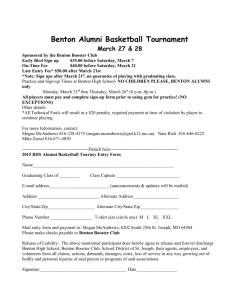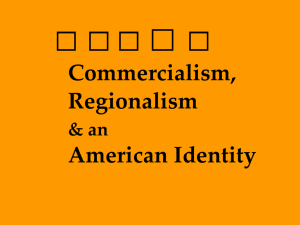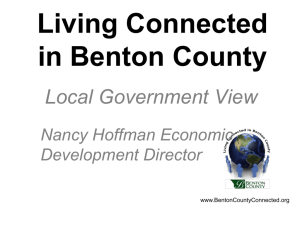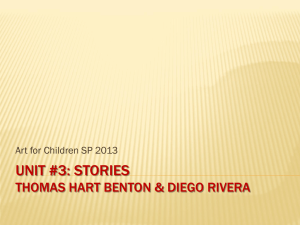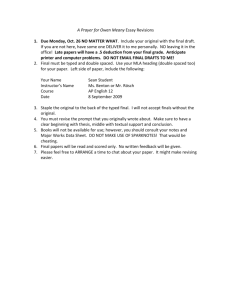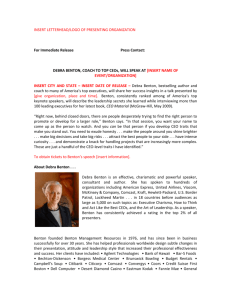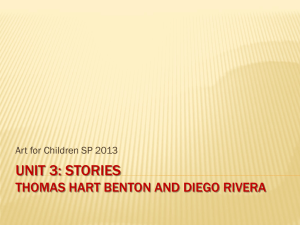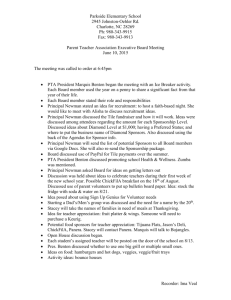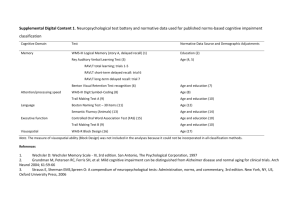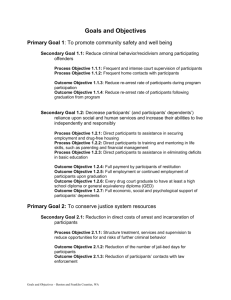Benton- ETRT PNEI ppp ACIM Dallas 2014
advertisement
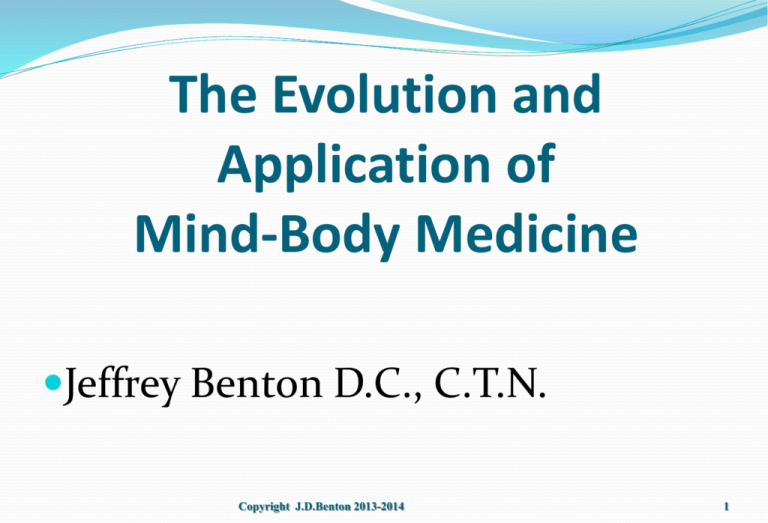
The Evolution and Application of Mind-Body Medicine Jeffrey Benton D.C., C.T.N. Copyright J.D.Benton 2013-2014 1 Presentation Outline Historical overview of Psycho – neuro- immunology Historical overview of the Emotional Trauma Release Technique™ Storage vessels for emotions The ‘startle reflex’ and its involvement in storing Traumatic events Live Demonstration ETRT worksheet Q&A Copyright J.D.Benton 2013-2014 2 In our world today Science as we know it is undergoing a revolution. For decades respected scientists in a variety of disciplines have conducted experiments which prove humans are not just a composite of bones, flesh and chemical. There is now proof that at the core of our essence is a pulsating energy field which connects and communicates with every other thing in the world. Praying 1984 Oil by Alex Gray Weaving medicine back together: mind-body medicine in the twenty-first century. Gilbert, MD J Altern Complement Med. 2003 Aug;9(4):563-70. Review. PMID: 14499032 In the past century, the medical profession has taken pride in the rapid and often effective advancement of diagnostic technology, surgical interventions, and pharmaceutical remedies. However, it has also witnessed the unraveling of the woven connection among mind, body, and the human soul. The history of the fall and rise of the concept of mind-body medicine is discussed, along with a review of the recent laboratory and clinical studies providing evidence of the direct connection between mind, body, and belief systems. Relevant components of a mind-body skills group program for clinical practices are addressed. 4 Where we came from – the gene 1944 – the discovery that DNA actually contained hereditary information. Scientists isolated pure DNA from 1 species of bacteria - species A, and added it to a culture which only had another species of bacteria species B. Within a short period of time species B displayed traits that were formerly only species A. 1953 – Watson and Crick presented the structure of the DNA double helix. 1960 – Alexander Rich determines the DNA-RNA combination Copyright J.D.Benton 2013-2014 5 Genetics vs. Epigenetic Inheritance or heritability was defined as the transfer of phenotypic traits from parents to offspring through genetic processes. Genetic processes involve genes and DNA sequences that are passed on to future generations through gametes (egg and sperm). Ex. Mendelian genetics Epigenetic processes involve an ensemble of heritable changes in gene activity that, do not implicate any change in DNA sequence, but can nonetheless be passed on to future generations through gametes. Copyright J.D.Benton 2013-2014 6 Epigenetics – ‘above genetics’ Nijhout, HF, Metaphors and the Role of Genes and Development, 1990 Bioessays 12(9):441-446 The notion that genes control biology is a supposition that has been disproven by scientific research. Nijhout summarizes “When a gene product is needed, a signal from its environment . . . activates expression of that gene. In other words, when it comes to genetic control “It’s the environment stupid”. Copyright J.D.Benton 2013-2014 7 Origins of endocrinology The first neuro-peptide was discovered around the turn of the century (1902). The substance was named secretin because it was shown to act on a dogs intestines to stimulate secretion of pancreatic juices. This astounded physiologists who up until that time assumed that all physiological function was controlled by electrical impulses from the nervous system. Radioimmunoassays in the 1970s confirmed the final endocrine role of secretin (what receptors it acts upon) Copyright J.D.Benton 2013-2014 8 Origins of endocrinology The first peptide to ever be replicated outside the body is oxytocin. This substance is released from the pituitary gland during childbirth. It binds with receptors in the uterus to induce contractions. This is the first neuro-peptide – whose end point was in the body. Copyright J.D.Benton 2013-2014 9 In 1972 Candace Pert discovered opiate receptors in the brain and neuro-peptides. “Most psychologists treat the mind as disembodied, a phenomenon with little or no connection to the physical body. Conversely Physicians treat the body with no regard to the mind or the emotions. But the body and the mind are not separate, and we cannot treat one without the other.” Candace Pert 10 What is Psycho neuro endocrino immunology? The field in the 1970’s was psychology Information Substances (IS) are neuro- peptides - the discovery of numerous neuropeptides. Copyright J.D.Benton 2013-2014 11 Where we Came from Pert’s discovery of the opiate receptor started a revolution that would later create profound shifts within nearly every field of modern medicine. This discovery would ultimately unite immunology, endocrinology, neurophysiology, psychology and biology into a cohesive theory about how our thoughts and emotions are capable of creating wellness or disease in our bodies. It would explain and validate what Eastern healing traditions, shamans, energy healers and most alternative practitioners have understood for eons. Copyright J.D.Benton 2013-2014 12 . Foss L The necessary subjectivity of bodymind medicine: Candace Pert's molecules of emotions. Adv Mind Body Med. 1999 Spring;15(2):122-34. This article discusses the relevance of Candace Pert's Molecules of Emotions (1997) to the development of bodymind medicine and argues that Pert's research and conceptual analysis provide the missing link connecting the messages of the mind to physiological effects in the body. The research and analysis also present a fundamental challenge to both the reigning body of medicine and the scientific commitment to so-called ‘objectivity’ by positing that a human organism that can act upon itself with thoughts and feelings--that is, through subjectivity. Copyright J.D.Benton 2013-2014 13 Jacobs GD. The physiology of mind-body interactions: the stress response and the relaxation response. J Altern Complement Med. 2001;7 Suppl 1:S83-92 There are key differences between mind-body medicine and alternative medicine. A central tenet of mind-body medicine is the recognition that the mind plays a key role in health and that any presumed separation of mind and body is false. The literature on mind-body medicine comprises more than 2000 peer-reviewed studies published in the past 25 years. Copyright J.D.Benton 2013-2014 14 What is Psycho neuro endocrino immunology? Pert’s research helped to create the foundation for an entirely new interdisciplinary branch of science called “Psychoneuroimmunology” or PNI. PNI unites the three classically separated sciences of neuroscience, immunology and endocrinology and their associated glands and organs into a multidirectional communication network, linked by information carrying molecules called (neuro)peptides. 15 Where are we Headed ? As the pioneering researcher Candace Pert wrote, “the conceptual division between the sciences of immunology, endocrinology, and psychology/neuroscience is a historical artifact.” mind-body-immune-endocrine system connection Copyright J.D.Benton 2013-2014 16 Where are we headed ? mind-body-immune-endocrine- heart-connection mind-body-immune-endocrine- heart-chakra connection Copyright J.D.Benton 2013-2014 17 Reversible left ventricular dysfunction precipitated by emotional stress Researchers evaluated 19 patients who presented with left ventricular dysfunction after sudden emotional stress. All patients underwent coronary angiography and serial echocardiography; five underwent endomyocardial biopsy. CONCLUSIONS: Emotional stress can precipitate severe, reversible left ventricular dysfunction in patients without coronary disease. Exaggerated sympathetic stimulation is probably central to the cause of this syndrome. Copyright J.D.Benton 2013-2014 18 The Biology of Belief With decades of groundbreaking research in the area of cellular biology, Dr. Lipton says he’s discovered that people have the power to control their own gene activity and all the cells in their body through their personal thoughts and beliefs. “It is the changing of the protein’s electromagnetic charges that is responsible for their behavior changing movement, not DNA.” 19 Evolving into a comprehensive program to bridge the mind-body with the Spirit to unblock the pathway to let spirit come down and do the healing Copyright J.D.Benton 2013-2014 20 99% vs. 1% The familiar reality is the physical 1 percent material realm in which we live. Yet without the 99% there wouldn’t be a 1%. Look around Copyright J.D.Benton 2013-2014 21 99% vs. 1% Look around What do you see? How did it get here ? Copyright J.D.Benton 2013-2014 22 A modern representation of the human body A bio-energetic representation of the body From the psychic energy system Alexgray.com 23 Another step in the evolution of the mind-body connection 24 Copyright J.D.Benton 2013-2014 25 What is an Emotional Trauma? Copyright J.D.Benton 2013-2014 26 Oftentimes, the event is so severe that that you remember the event, as a defense mechanism, so your reticular activating system (RAS) is now hyper-vigilant so you never repeat the occurrence. This phenomenon is known as: ‘fixation of emotion’. Copyright J.D.Benton 2013-2014 27 Disease: Triggered by Unexpected Shock & Traumas Dr. Ryke Geerd Hamer discovered that not only cancer but all diseases are triggered by unexpected shock & traumas. Hamer proposed that cancer stems from emotional-psychic causes that remain unresolved over long periods of time. According to Dr. Hamer’s observations the body is able to heal itself of most cancers if the patient is given therapy & support for de-programing & releasing the harmful effects of the shock-conflict on their body. He has been prosecuted for his practices by many in academic & traditional medicine. 28 Inherited Family Trauma: The Romeo and Juliet cascade Montague’s and the Capulet’s generational fued Hellinger observed that many of us unconsciously "take on" destructive familial patterns of anxiety, depression, anger, guilt, aloneness, alcoholism and even illness as a way of "belonging" in our families. Bonded by a deep love, a child will often sacrifice his own best interests in a vain attempt to ease the suffering of a parent or other family member. Copyright J.D.Benton 2013-2014 29 How long does it last ? Now, 20 years later, you don’t need that defense mechanism anymore – but you don’t know how to turn it off. This is because emotions have no expiration date, unlike a carton of milk. It’s as if the emotion has been affixed to a particular event – and every time you think of the event that associated emotion appears. Copyright J.D.Benton 2013-2014 30 Epigenetic changes happen in mammals Researchers taught two groups of male mice to fear odors by zapping their feet with an electric shock every time they blew scented air into their cages. The experimental group became afraid of cherry blossoms with a hint of almond, and the control group feared alcohol. After three days of fear conditioning, the cherry blossom mice later reproduced. The resulting offspring, having grown to adulthood, had a heightened jumpiness to the cherry blossom smell, despite never having been exposed to it. They could also pick up on lesser amounts of cherry blossom in the air, which reflected their changes in olfactory and brain anatomy. to the next generation. 31 Epigenetic changes happen in mammals The findings were also verified by comparing the epigenetic markers on the DNA of sperm, specifically on the gene responsible for detecting cherry blossoms. On the sperm of the cherry-blossom-fearing mice, there was less of the methylation that can silence genes, possibly pointing to a mechanism of how the information got passed down. Through a process dubbed “reprogramming,” these epigenetic markers were thought to be erased. But recent research — this study included — has shown that some of these markers may survive 32 PTSD Mothers have children with higher sympathetic system activation These results demonstrate that children of mothers, who themselves have history of childhood physical and emotional abuse, have higher dark-enhanced startle as well as greater sympathetic nervous system activation - as compared to children of mothers who do not report a history of childhood physical and emotional abuse. Copyright J.D.Benton 2013-2014 33 ETRT was developed in 2002 to effectively address the “fixations of emotions” held within the body. The end product is a more neurologically integrated and healthier person. ETRT is a natural healing procedure that disconnects your behavioral reaction from a traumatic event. Copyright J.D.Benton 2013-2014 34 How does ETRT Help You? ETRT helps normalize unresolved physical and/or behavioral patterns in the body that occur from trauma. Copyright J.D.Benton 2013-2014 35 How does ETRT work ? Muscle Testing as a method to receive neurological feedback Hydration and accurate Muscle Testing Copyright J.D.Benton 2013-2014 36 What is muscle testing – how does it work In 1964 George Goodheart D.C. the founder of Applied Kinesiology (AK) discovered that muscles can be turned off (inhibited) or on (excited) by numerous stimuli. All people are designed with a fascinating energetic and neurological monitoring system. Copyright J.D.Benton 2013-2014 37 Applied Kinesiology is about excitation and inhibition of neural pathways. AK is a series of sensory receptor based diagnostic challenges followed by monitoring of manual muscle testing outcomes. 38 As stimulus based organisms, changes can be observed through autonomic somatic and windows which can be monitored. Examples of various autonomic windows that can also be monitored include pupil light response, blood pressure, heart rate, startle reflex etc.) AK techniques are about testing and modifying receptor stimulation results in a net effect of optimal neurological function which leads to optimal health. Copyright J.D.Benton 2013-2014 39 Examples of a somatic window includes changes toward normalization of muscle facilitation / inhibition (as measured in muscle balance, range of motion, deep tendon reflexes) and through the changes in muscle testing responses. These responses are termed conditional facilitation and conditional inhibition and are dependent on the conditions present at the instant of the muscle test 40 How does ETRT work ? Startle response – is a response to sudden, startling stimuli. Ex. Sudden noise, unexpected touch. Physiology of the startle response includes cessation of breath, and increase of sympathetic response. An individual's emotional state may lead to a variety of different responses – based on their epigenetics and life experiences. (See slides 31-33 above) Copyright J.D.Benton 2013-2014 41 The “ Startle ” Response ETRT unwinds the “Startle” Response Copyright J.D.Benton 2013-2014 42 Now let’s look at how life trauma creates interference in your nervous system. Copyright J.D.Benton 2013-2014 43 The 3 Classifications of Trauma Shock Trauma Emotional Trauma The mix Copyright J.D.Benton 2013-2014 44 Putting it All Together ETRT Diagram Shock Trauma Emotional Trauma Shock + Emotional Hidden Copyright J.D.Benton 2013-2014 45 Live Demonstration Volunteer from the Audience Take a Before picture Complete the ETRT evaluation form Take an after picture 46 When the nervous system is working properly, and the brain is able to communicate with the body without interference, you have 100% function. 47 Balance of Health Copyright J.D.Benton 2013-2014 48 For more information Email: lightthc@gmail.com 49 Science has not proven everything Parachute use to prevent death and major trauma related to gravitational challenge: systematic review of randomised controlled trials Gordon C S Smith, professor1 and Jill P Pell, consultant2 Study selection: Studies showing the effects of using a parachute during free fall. Main outcome measure Death or major trauma, defined as an injury severity score > 15. Results We were unable to identify any randomized controlled trials of parachute intervention. Copyright J.D.Benton 2013-2014 50 What’s the next step “The word ‘incurable’ just means we do not know the answer right now.” — Dr. Valerie Hunt UCLA Professor Emeritus Founder: Bio-Energy Fields Foundation 51
